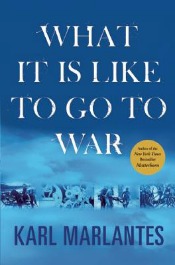Title: What It Is Like to Go to War
Author: Karl Marlantes
Genre: Nonfiction
Year: 2011
Acquired: Book Expo America
Rating: 




Review: I think one of the reasons I’ve procrastinated on writing this review is because I just don’t quite know what to say about What It Is Like to Go to War. Karl Marlantes’ nonfiction follow-up to his widely-regarded novel Matterhorn a fascinating hybrid of a nonfiction book — part memoir, part history, part manifesto — that explores a central conflict from Marlantes’ time as a Marine:
The Marine Corps taught me how to kill, but it didn’t teach me how to deal with killing.
Marlantes has an impressive intellectual background, and he pulls from a huge range of sources to develop his thesis about how we can help the young warriors (a deliberately chosen descriptor for soldiers) we send to war as they fight and when they come home. As Marlantes explains near the end of the book:
Throughout this book I have attempted to honestly share my experiences of combat with an eye toward how I might have managed those experiences with more wisdom and psychological, spiritual, and ethical maturity. I have argued that had I been more conscious when I was fighting in Vietnam, I would have contributed just as effectively, or even more effectively, tot he war aims of those in power. I would have wreaked less havoc and pain and still gotten the job done.
As I read, I felt a bit like I was sitting down and trying to have a discussion with someone who clearly knows more and has thought more about a topic than I have. That’s not to say the book in inaccessible, because it’s certainly not. Marlantes makes his arguments clearly and without condescension. But I also ended up not really knowing what to say in response to many of his arguments except, “Yes, absolutely!” I’m very curious to read and hear what other soldiers or military experts might have to say in response — any good sources to seek out, let me know!
What It Is Like to Go to War is a meditation on what it is like to be a warrior, and a compelling argument about what we can to do help young warriors when they return from battle. It’s a wide-ranging and thoughtful book that I hope will make the rounds among the sorts of people who can make the types of decisions that will most help the young men and women we send to war.
Other Reviews:
If you have reviewed this book, please leave a link to the review in the comments and I will add your review to the main post. All I ask is for you to do the same to mine — thanks!


Comments on this entry are closed.
This sounds like a powerful book. Like you, I’d love to know what soldiers think of it.
It was, although it seems like all books i read about Vietnam really get to me. I can’t even really imagine how horrifying that must have been.
I loved Matterhorn, so I’d love to read this book at some point. I’m sure it’ll be a lot different being non-fiction, but I’d really love to hear what Marlantes has to say about it.
I really want to read Matterhorn. I sort of wish I’d read that before this one, but either way I think it will be a fascinating comparison.
I’ve been wanting to read this book but I haven’t read Matterhorn yet and I want to read that first. Sounds like this book is an eye-opener!
Yes, absolutely. I don’t think many people would be willing or able to write about this kind of experience as candidly as Marlantes does in this book.
That sounds like a fair response to have when you’re quite unfamiliar with a subject, which can sometimes be so overwhelming that all you find yourself doing is nodding/shaking your head in an attempt to take on some new understanding while you’re busy’ I’ve definitely had that feeling.
I see to do that a lot, especially with the nonfiction I’ve been reading lately! I’m glad I’m not the only one.
This sounds rather interesting. It is not something I have read anything about at all.
The book isn’t long, so it could be a good way to start delving into this topic.
I agree — this book is remarkable. When I finished reading it, I just felt stunned.
Stunned is a really good word. It’s a lot to take in.
I LOVED Matterhorn. I have been hesitant to read this one because of that though. I don’t want this to influence my thoughts on his novel. My husband was in the military. Maybe I should have him read it first.
I’d be really curious what your husband, a military person, would have to say about the book. I’m really not sure how this book would impact the novel, but I’m sure you couldn’t read it without at least thinking about those stories.
Yes absolutely does seem like a valid response! I’ve yet to read this author but must at some point…
He’s a remarkable writer. It did make me excited to read Matterhorn.